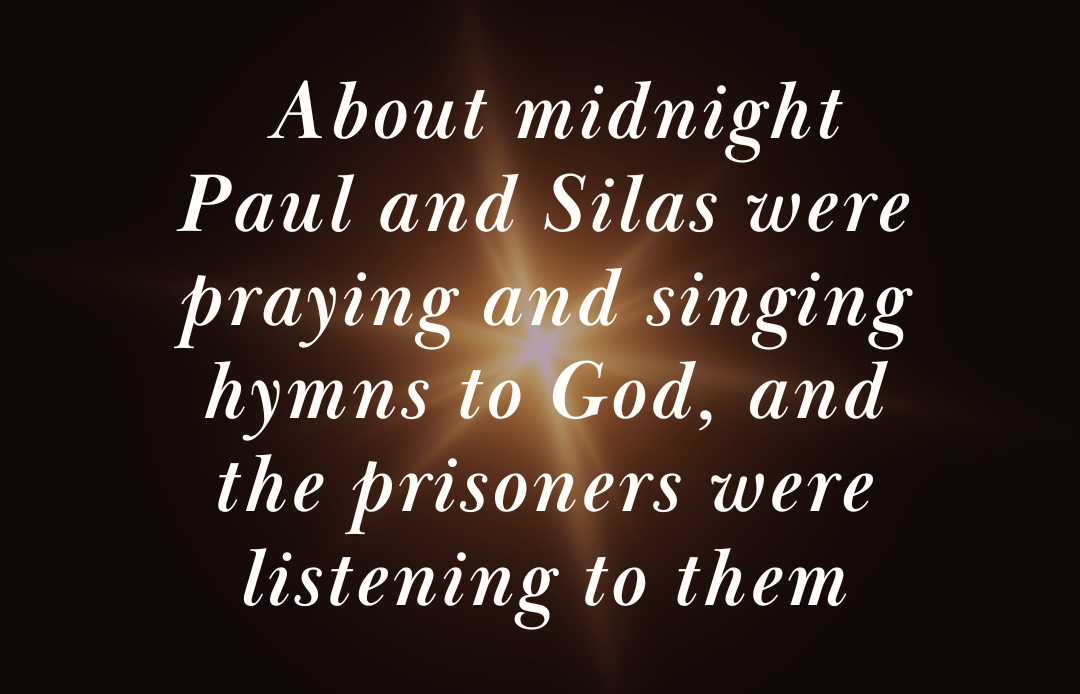
“Yes I will, lift You high in the lowest valley Yes I will, bless Your name”
How do you respond when things don’t go your way? One of the sobering things about being a parent is that you see yourself in your kids, and sometimes, you don’t like what you see. Our children can often act as a mirror revealing to us what we are really like. When it comes to hard or disappointing times I’d love to say I handle it well, but if I’m honest, I rarely do, and more often than not I act just like my children.
This Sunday, we are going to look at two men who give us a model for how we should handle disappointment or hardships.
In our main text for this Sunday, we are greeted with the following words:
“About midnight Paul and Silas were praying and singing hymns to God, and the prisoners were listening to them.”
– Acts 16:25
A bit of backstory helps us understand why this verse is significant. Paul and Silas were wrongly imprisoned for casting out a demon from a slave girl. They weren’t imprisoned so much for freeing her from demon possession, but rather because casting out the demon threatened to ruin her owners financially. In response, the owners had Paul and Silas beaten and thrown into jail (Acts 16:16-24). They weren’t just beaten and jailed but were also denied the rights owed to them under Roman law. Due to their appearance, they were assumed to be non-citizens and were treated accordingly, though they were actually Roman citizens with legal rights that were ignored.
So, beaten, wrongfully imprisoned, ignored, and chained—this is the situation in which we find Paul and Silas. Yet, they are doing the unthinkable in Acts 16:25: singing praises to God.
I love to sing, and I’ve also developed a reputation as a whistler. There’s a natural song that flows from within. However, there are times in life that silence that inner song. This would certainly have been one of those times. Yet Paul and Silas were not playing the “what if” game, nor were they lamenting their decision. They weren’t overcome with sorrow by their situation; they were praising God.
John Stott writes, “Anyone can be happy in pleasant circumstances, but real joy comes only from within, and is a gift available to Christians at all times. Instead of cursing men, they blessed God.”
These men had that joy from within and as a result, people in the prison were taking notice.
In the next verse, an earthquake creates an opportunity for the prisoners to escape. The doors open, and the stocks are loosened by the quake. Thinking all the prisoners have escaped, the guard is about to kill himself because, under Roman law, guards who let their prisoners escape faced the same punishment the prisoners were due to receive.
But Paul calls out, “Don’t! We are all still here.” Because of this, the jailer and his entire family come to salvation.
Where am I going with this?: I think our attitudes and actions serve as testimonies to the power and presence of God.
I believe they make an even greater impact when, in the midst of difficult situations, we still point to God through our attitudes and actions. This shows those around us that we aren’t ‘fair-weather fans’ in our relationship with God.
As Stott says, “real joy comes only from within.” This doesn’t mean we are joyful by default, but that the Spirit of God dwells within us.
In our opening song this week, we’ll sing the following chorus:
“Yes I will, lift You high in the lowest valley
Yes I will, bless Your name
Oh, yes I will, sing for joy when my heart is heavy
All my days, oh yes I will”
It’s not about being a Christian who refuses to acknowledge the difficulties in our lives or the emotions that come with them. It’s about being a Christian who, in the midst of trials, chooses to still point to God through our attitudes and actions.
Doing so validates the truths we sing about in our worship services—the truths about God’s virtues and deeds, His help in times of distress, and Jesus as our only hope.
And helps others see God